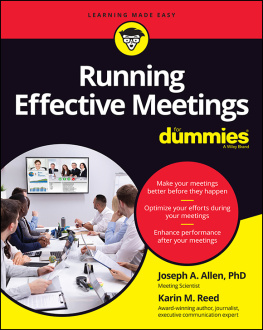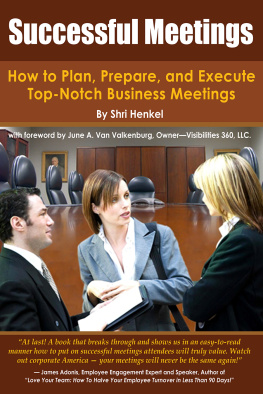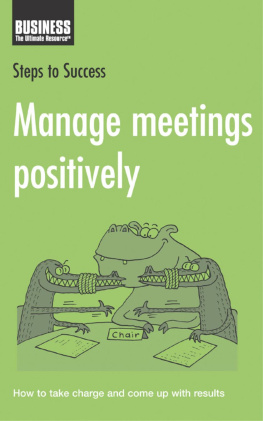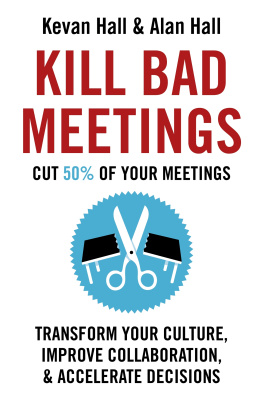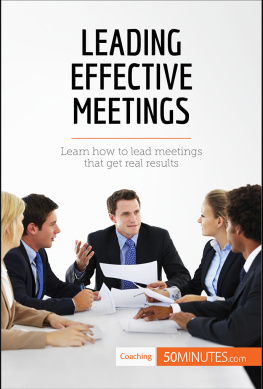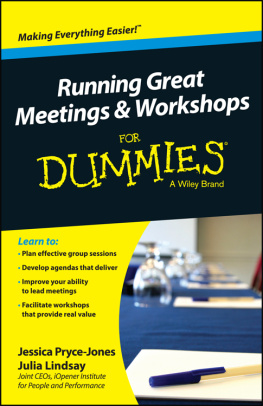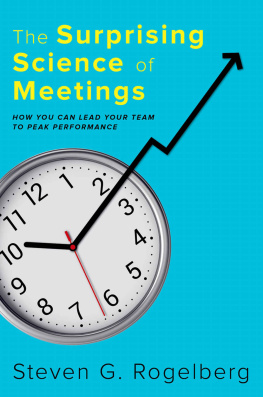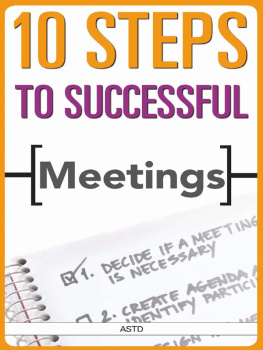M eetings th at Work
A Practical Guide to Teamworking in groups
Catherine Widdicombe
The Lutterworth Press
Cambridge
To my mother
to whom I owe so much
The short extract from Vincent J Donovan, Christianity Rediscovered SCM Press 1978 is used by permission.
Every effort has been made to trace the copyright holders of material used in this book. Any inadvertent infringement will be corrected in future reprints.
Never accept and be content with unanalyzed assumptions, assumptions about the work, about the people, about the Church or Christian ity. Never be afraid to ask questions about the works we have inherited or the work we are doing. There is no question that should not be asked or that is outlawed. The day we are completely satisfied with what we have been doing; the day we have found the perfect unchang eable system of work, the perfect answer, never in need of being corrected again, on that day we will know that we are wrong, that we have made the greatest mistake of all.
Vincent J. Donovan
ACKNOWLEDGEMENTS
My manifold indebtedness to George Lovell is acknowledged in the Introduction. He has been a loyal, supportive and creatively critical colleague, mentor and friend. It was he who first suggested that I write this book. My gratitude to him for all he has given me can never be adequately acknowledged or repaid. Another person without whom this book would never have been written is T.R. Batten. Meeting him first in the written word and then in person led me to develop the understanding and skills I was searching for at a major moment of transition in my life. He has encouraged and stood by me ever since. I am deeply thankful to God that both of them have been part of my life.
I am also grateful to all those who have been my colleagues and co-workers over the years. They are too numerous to mention by name but I well recall the first, John V. Budd, who, in accepting an invitation to coffee, took on a co-learning colleagueship which started me practising non-directive group work. Only I am aware of and surely do not appreciate fully the patience and forbearance my colleagues down the years have exercised in my regard. Not only with them but from them I have learnt much.
To members of all the hundreds of groups I have ever worked with, I say thank you. Many will never read or know of my gratitude. They have taught me much as we struggled to think, wrestled with problems, overcame crises, faced many an impasse or backed out of cul-de-sacs. Good humour, commitment, confusion, frustration, anger and excitement are among the many ingredients which have been part of such relationships. From all I have learnt.
I am also indebted to those who have read, criticised and improved my manuscripts: above all this includes Margaret Brown who has given many hours of detailed work and been constantly encouraging as well as challenging. My thanks also go to those who have typed and checked the numerous drafts, particularly May Farina and Irene Picton who were endlessly and cheerfully patient.
Lastly, I thank my Grail community which over the years has given me the freedom to follow the strong call I felt to Church and Community Development work, out of which the present book has been forged. Despite misgivings and puzzlement in the early days, they have been generous in their support, spiced as it was with the necessary element of challenge. I am deeply grateful: only I know what this has meant to me.
INTRODUCTION
In the Western world we have a plethora of groups and meetings. From multinational businesses to enclosed religious orders, from professional bodies and statutory services to church and community groups, from teams of colleagues to training courses, from bible study to self-help therapy. People depend largely on meeting together to keep things going and to move things forward. Not another meeting! is a sad reflection on the quality of many meetings. They are too often experienced as deadening rather than lifegiving. This book is written in the conviction that group meetings, teams and committees of all sorts have a potential both for development and enjoyment which is seldom realised.
Meetings that Work as a title needs some explanation. What sort of meetings are being addressed? The word meeting as I am using it, refers to a gathering of people met together with a task to do which entails the exchange of thoughts and feelings. Simply said but enormously complex.
The task of a group or team may include such things as planning and organising work or research of one kind or another; thinking more deeply about some subject such as racism or religion; learning a skill or giving mutual support. Its task may concern solely the members within the group or it may be to do with others beyond its bounds, as for instance, a staff meeting or a business team which has to relate to a complex system of groups and organisations both locally and nationally. What is written is both about how to help people work at the task and about engendering the kind of interpersonal relationships which will enable them to do so.
Groups may be temporary or long-term; new or established; large or small. Teams may be autonomous or part of a larger organisation. Their meetings may be more or less formal or informal. Groups such as committees, councils, boards, and professional associations will operate at a more formal level than groups such as fellowships, community or church groups, those focussing on a specific issue such as justice and peace, or catering for particular people, youth, young mothers, or the elderly. Many firms are now setting up interdisciplinary teams concerned with new developments and which, for greater effectiveness, need to work in an informal collaborative style rather than in a more formal hierarchical mode.
Groups may have a permanent or rotating chairperson or facilitator who may be self-chosen, elected by the members or appointed by the organisation. The members may be elected or co-opted, their membership may be voluntary, expected or compulsory. The group may be part of their work life or their leisure. Attendance may be regular or fluid. They may or may not have a shared history reaching into the past. They are likely to bring to a meeting a variety of personal needs and concerns, many of which will never be openly acknowledged. These may be connected with the group or completely separate from it, something in their private life which is preoccupying them. Clearly, the task of making a meeting work is complex and challenging.
This book is not primarily written for purely social or fellowship groups at one end of the spectrum nor for formal committees at the other, but for that wide range of groups in which people meet to do a task and want to work at that task more systematically and creatively.
All such groups and teams, whatever their degree of autonomy, and they vary widely, experience certain constraints, internal or external, which reduce their freedom to act. These may be established by custom, tradition, legal requirements, or the situation in which they find themselves. But however binding the constraints, as for instance, committees with their constitutions, procedures, given purposes or tasks, the members always retain a degree of freedom to think and pursue that for which the group was formed. This book is about ways and means of helping groups of people to think, discuss and act together within that area of freedom which is theirs, or to use it to question and push out the boundaries if they decide they cannot work effectively within them.
It is written for anyone who wants to help people in a meeting of any kind to work together in a collaborative way, believing that individuals, groups and communities flourish when people have a say in decisions which affect them.
Next page

